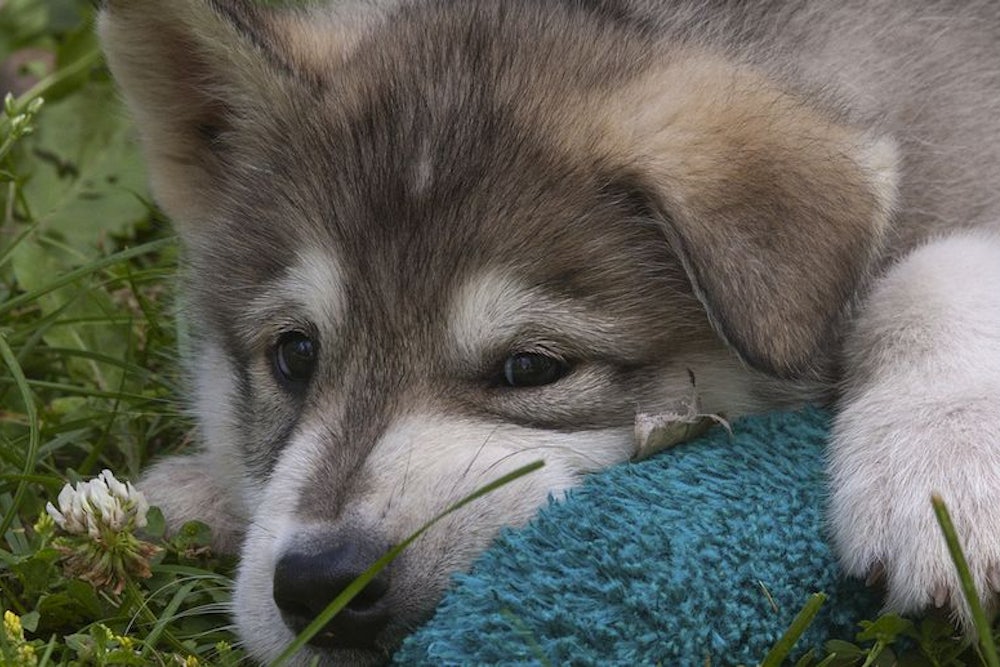The internet told me recently that I won’t love my puppy in three months time. He’s not a puppy; he’s an indeterminate age. When my husband and I adopted him, a carpenter who was building us a bookshelf grabbed his muzzle, looked at the plaque on his teeth, and told us he was four. We’ve counted birthdays from that date, but he’ll always be a puppy—that’s how much I love him.
In about three months, after nine months of cooking, another little creature’s going to enter my life (chubbier, less hairy, with a different battery of noises and excretions) and, according Allison Benedikt of Slate, I’ll then rue the day I got Branston Pickle (named after the English condiment). “The One Thing No One Tells You Before You Have Kids: Don’t Get a Dog,” read the headline of the piece she published on Monday, which had more than 4,000 comments last time I checked. “A very nonscientific survey of almost everyone I know who had a dog and then had kids now wishes they had never got the dog,” she writes. Once she entered this demographic … “It’s not that I don’t love my dog. It’s just that I don’t love my dog.”
I can’t begin to parse all the objections that might have been raised in those thousands of comments, but here’s one more: Getting a dog was the primary thing that convinced me I could handle kids—or rather reassured me that my husband was capable of the endeavor. How do you enter that catch-22 into the kids-v.-dogs calculus?
My husband and I have the same, boring, sadly gender-delineated squabbles that lots of couples have: I think that I cook, clean, and generally do more around the house than he does, and he’d probably agree with this assessment, most of the time. I complain that I’m taking on the second shift before we even have kids. He says: Just don’t; let’s eat out and let the grout in the shower decay. To a certain extent, he’s right: Domestic peace can be found in learning not to care—or in outsourcing, if you can afford it.
But no matter how zen I try to be about household matters, kids loom as a project of an entirely different scale. As far as I can tell, benign neglect and money can’t address all the issues that they raise. You need elbow grease and time—and these were precisely the things I found it hard to extract from my husband when I wanted to, say, organize the closets.
But then we got Branston. My husband and I joke that we bought an apartment so that I could get a dog; our rental didn’t allow pets. Still, after the contract had closed, our bank accounts had been drained, and the living room had been repainted, it was my husband who had to convince me to take the plunge and retrieve the furry animal that I had photographed on my iPhone in a windowless basement at the animal shelter, amid cacophonous yapping and a white noise machine that wasn’t helping anything. “You’ve wanted this for a long time,” he reminded me.
The best thing Branston brings into our lives is joy: He’s always happy to see us! Always! And he doles out little dollops of oxytocin free of charge! But if I had to list the second best thing, I’d say it’s the way he’s improved our relationship. I realize this sounds saccharine, but I credit the dog for making my husband more attentive to a whole genre of things that I would have guessed would only register on my radar: dog food supplies, vaccinations, getting him to the groomer. (It’s a 45 minute drive away, but my husband insists Paws of Enchantment is the only outfit that will do.) His attentiveness to the well being of our pet runs so deep that he once had a veterinarian—the same specialist who attends the tigers at the National Zoo—do an precautionary ultrasound on our pup, just, you know, to be safe. I was so nonplussed by the alleged issue that I refused to even go along.
This isn’t an unconventional argument. Obviously, there are basic, keeping-a-creature-alive lessons in having a pet that in, a small way, I’d guess, prepare you for childrearing. But, if I’m more specific about the way in which Branston has made me feel more equipped to have kids with my husband, it has more to do with alleviating some of my gender-based anxiety about the household-chore tally and how it might play out against our careers, our social lives, and the different ways we want to spend our time when we add the biggest household chore of all. Because he actually cares about the dog, it’s not that hard to get him to care about doing annoying stuff that goes along with the dog. I think—I hope—it’ll be the same with kids.
As for Branston, I’m sure he’ll suffer. No more trips to the tiger doc. No more doggie day spa days. Less attention overall, I’m sure. To some extent, predictions are pointless. As many, many people have told me: I have no idea what I’m in for. But, less love? I doubt it.
Chloe Schama is a story editor at The New Republic. Follow her @ChloeSchama.
Image via Shutterstock.
